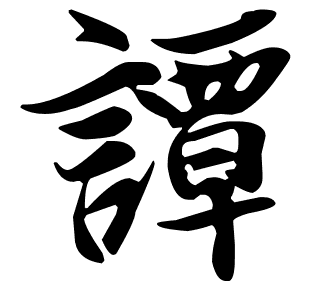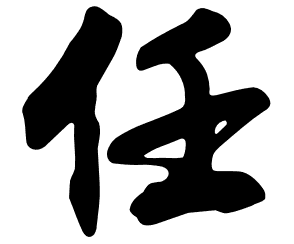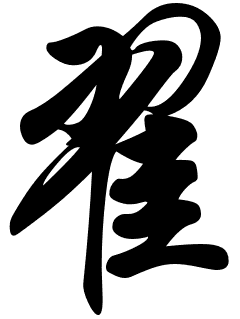Related Research Articles

Song is the pinyin transliteration of the Chinese family name 宋. It is transliterated as Sung in Wade-Giles, and Soong is also a common transliteration. In addition to being a common surname, it is also the name of a Chinese dynasty, the Song dynasty, written with the same character.
Luo or Lo refers to the Mandarin romanizations of the Chinese surnames 羅 and 駱. Of the two surnames, wikt:罗 is much more common among Chinese people. According to the Cantonese pronunciation, it can also refer to 盧.
Ng is a Cantonese transliteration of the Chinese surnames 吳/吴 and 伍. Alternately, it is a common Hokkien transcription of the name 黃/黄.
Wong is the Jyutping, Yale and Hong Kong romanization of the Chinese surnames Huang and Wang, two ubiquitous Chinese surnames; Wang, another common Chinese surname; and a host of other rare Chinese surnames, including Heng, Hong, Hong, and Hong

Ye is a Chinese-language surname. It is listed 257th in the Song dynasty classic text Hundred Family Surnames, and is the 43rd most common surname in China, with a population of 5.8 million as of 2008 and 2019.

Cài is a Chinese-language surname that derives from the name of the ancient Cai state. In 2019 it was the 38th most common surname in China, but the 9th most common in Taiwan, where it is usually romanized as "Tsai", "Tsay", or "Chai" and the 8th most common in Singapore, where it is usually romanized as "Chua", which is based on its Teochew and Hokkien pronunciation. Koreans use Chinese-derived family names and in Korean, Cai is 채 in Hangul, "Chae" in Revised Romanization, It is also a common name in Hong Kong where it is romanized as "Choy", "Choi" or "Tsoi". In Macau, it is spelled as "Choi". In Malaysia, it is romanized as "Choi" from the Cantonese pronunciation, and "Chua" or "Chuah" from the Hokkien or Teochew pronunciation. It is romanized in the Philippines as "Chua" or "Chuah", and in Thailand as "Chuo" (ฉั่ว). Moreover, it is also romanized in Cambodia as either "Chhay" or "Chhor" among people of full Chinese descent living in Cambodia and as “Tjhai”, "Tjoa" or "Chua" in Indonesia.
Quán is the Pinyin romanization of the Chinese family names 權/权 and 全, as well as a customary spelling of 關. All written forms of the name are rare enough that they do not appear in the list of the 100 most common Chinese surnames.

Tan is a common Chinese surname 譚, and is considered the 56th most common.

Lin is the Mandarin romanization of the Chinese surname written 林, which has many variations depending on the language and is also used in Taiwan, Singapore, Malaysia, Philippines, Indonesia, Japan, Korea, Myanmar, Vietnam, Thailand, Cambodia.

Zhōu is a Chinese-language surname. In places which use the Wade–Giles romanization such as Taiwan, Zhou is usually spelled as Chou, and it may also be spelled as Chiau, Chau, Chao, Chew, Chow, Chiu, Cho, Chu, Jhou, Jou, Djou, Jue, Jow, or Joe. Zhou ranks as the 10th most common surname in Mainland China as of 2019. In 2013 it was found to be the 10th most common name, shared by 25,200,000 people or 1.900% of the population, with the province with the most being Hunan. Derived from the Zhou dynasty, it has been one of the ten most common surnames in China since the Yuan dynasty. It is the 5th name on the Hundred Family Surnames poem. The Korean surname, "Joo" or "Ju", and The Vietnamese surname, "Châu" or "Chu", are both derived from and written with the same Chinese character (周). The character also means "around". Zhōu also stands for other, rare Chinese family names, 舟, 州,and 洲.

Zeng is a Chinese family name. In Cantonese, it is Tsang; In Wade–Giles, such as those in Taiwan, Tseng or Tzeng; in Malaysia and Singapore, Tsen, Chen or Cheng; in the Philippines, Chan; in Indonesia, Tjan; in Vietnam, Tăng. The surname Zeng is the 32nd most common surname in Mainland China as of 2019. It is the 16th most common surname in Taiwan. It meant "high" or "add" in ancient Chinese. Zeng was listed 385th on the Hundred Family Surnames.
Chin is a surname. As a Chinese surname or Korean surname, it could originate from various Chinese characters, and it is also a surname in other cultures as well.
Hung is a non-pinyin romanisation of multiple Chinese surnames, based on different varieties of Chinese.
Ching is a Chinese and English surname.

Lu is the pinyin and Wade–Giles romanization of the Chinese surname written 陆 in simplified character and 陸 in traditional character. It is also spelled Luk or Loke according to the Hong Kong Cantonese pronunciation. Lu 陆 is the 61st most common surname in China, shared by 4.2 million people. Most people with the surname live in southern China; 44% live in just two provinces: Jiangsu and Guangxi. Lu 陸 is listed 198th in the Song dynasty classic text Hundred Family Surnames.

Jì is the Mandarin pinyin romanization of the Chinese surname written 季 in Chinese character. It is romanized as Chi in Wade–Giles, and Gwai in Cantonese. Ji is the 142nd most common surname in China, with a population of 960,000. It is listed the 134th in the Song dynasty classic text Hundred Family Surnames.

Rén is the Mandarin pinyin romanisation of the Chinese surname written 任 in Chinese script. It is romanised as Jen in Wade–Giles, and Yam or Yum in Cantonese. It is listed 58th in the Song dynasty classic text Hundred Family Surnames. As of 2008, it is the 59th most common surname in China, shared by 4.2 million people. In 2019 it was the 49th most common surname in Mainland China.

Zhai is the Mandarin pinyin romanization of the Chinese surname written 翟 in Chinese character. It is romanized Chai in Wade–Giles, and Chak in Cantonese. It is listed 292nd in the Song dynasty classic text Hundred Family Surnames. As of 2008, it is the 120th most common surname in China, shared by 1.4 million people.
Ni is the Mandarin pinyin and Wade–Giles romanization of the Chinese surname written 倪 in Chinese character. It is romanized Ngai in Cantonese. It is romanized as "Geh" in Malaysia and Singapore, and "Ge" in Indonesia, from its Minnan / Hokkian pronunciation. Ni is listed 71st in the Song dynasty classic text Hundred Family Surnames. As of 2008, it is the 116th most common surname in China, shared by 1.4 million people.
Chow is a Chinese and English surname.
References
- ↑ Chao, Sheau-yueh J. (2000). Genealogical Research on Chinese Surnames. Genealogical Publishing Company. p. 117.
- ↑ "山西令氏大有来头 网友观点:令狐名气大却不常见". Phoenix Television . 21 June 2014. Retrieved 8 July 2017.
- ↑ Starostin, Sergei. "林". Sino-Tibetan Etymology Database. Retrieved 20 October 2015.
- ↑ "南京生僻姓氏调查:电台主持本姓'铃'全国8人是一家". Eastday. 4 January 2011. Retrieved 7 July 2017.
- ↑ Bardsley, Charles Wareing Endell (1901). A dictionary of English and Welsh surnames, with special American instances. London: H. Frowde. p. 485.
- ↑ Hanks, Patrick; Coates, Richard; McClure, Peter, eds. (2016). The Oxford Dictionary of Family Names in Britain and Ireland. Oxford University Press. p. 1595. ISBN 9780192527479.